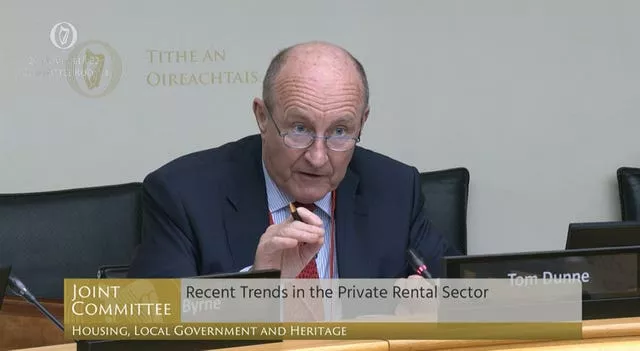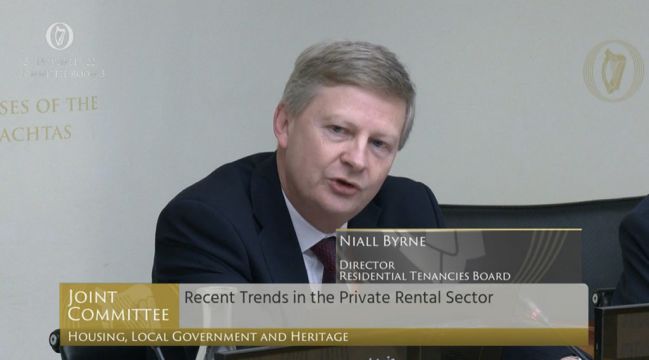Ireland’s rental regulator has organisational problems in dealing with what is a complex and evolving sector, a committee has heard.
The Residential Tenancies Board (RTB) faces issues with management, strategy and resources which has hampered the “small public body”, its director has said.
Representatives of the RTB, which maintains a register of tenancies and resolves disputes between landlords and tenants, appeared before the Oireachtas housing committee on Tuesday over trends in the rental market.
Its director of 10 months, Niall Byrne, acknowledged issues in reported delays in responding to people’s queries and in landlords registering tenancies, saying that it was not acceptable.
Mr Byrne said the issues were “deep-seated”, with some relating to a new IT system not meeting the “requisite standard”.
“Unfortunately the situation that currently obtains is that many people are finding it difficult to deal with the RTB,” he said, adding that apologies had been made to those affected.

A new portal-based registration system introduced in November last year, in which “significant” public money was invested, “is not delivering to the requisite standard”, Mr Byrne said.
“We’re working very hard to remedy that, but it is a programme of work that will take us into next year to fully complete.
“It may be quarter two next year before we are, as it were, fully out of the woods in relation to this system performance.”
He also said that despite putting in additional resources, with double the number of people working on the RTB account to answer people’s queries, “we still have big backlogs”.
“We are putting in the resources to try and support people but we still have big backlogs, and that’s the fact of it unfortunately.
“I don’t think necessarily the issue is just resources, I think some of the issue is about management and it’s about control and it’s about the strategy of the RTB.
“As the chair mentioned in the opening statement, we are currently developing a new statement of strategy from 2023 to 2025.
“Our core area of attention is to focus on the organisation itself. The organisation requires significant development, in my view.
“I’m not criticising any of my colleagues – absolutely not. But you know, structure is very, very important and when the structure moves out of alignment with the needs of the environment and the needs to, mission of the organisation, well then difficulties do arise.
“I attribute some of the current problems to the organisation’s structure,” he said.
Mr Byrne welcomed the additional resources that it had been given, such as the extra two million euro in funding allocated to the RTB in Budget 2023, and two deputy directors.
He said that he had requested a third deputy director to deal with the digital and data issues that they face.
As a small public body, Mr Byrne said that the RTB faces difficulties trying to tackle “quite a complex area of administration using quite complex legal provisions”.
Mr Byrne also acknowledged the issues raised by Social Democrats TD Cian O’Callaghan, who highlighted problems around the RTB not investigating an issue if a renter does not have proof of the landlord’s address.
“I have discussed this with my colleagues – why is it not possible to find an address for a landlord?”
He said that he did not regard it as an “acceptable situation” that a person may not be able to have their rights vindicated simply because an address cannot be found.
“One of the things that I’m very committed to and as mentioned earlier, in our new strategy, we are going to call out a number of these issues that relate to the RTB’s effectiveness as a regulator.
“So originally, the RTB was set up to be a dispute resolution body and it also registered the tenancies so that there’d be knowledge about what the actual cohort of tenancies out there to be regulated would consist of, but the RTB wants to be a very proactive type of regulator and it didn’t have a range of appropriate regulatory powers.
“So I’m very keen that we would develop our regulatory approaches, our methods and strategies, so that we’re much more proactive.
“So I am very keen that we would take a proactive approach towards something like finding out an address.
“As far as I’m concerned, it should be possible to find the address, and we should do that, and if we don’t have powers to do it currently, then we should ask to acquire those powers.”
He added: “We don’t want to be the kind of regulator that looks like where the left hand doesn’t know what the right hand is doing.”
An RTB survey indicated that 15 per cent of landlords are planning to sell their rental properties in the next five years, with 10 per cent likely or very likely to want their property back for their own or family’s use.
Chairman Tom Dunne told the Oireachtas housing committee that this indicated “there’s not as many landlords leaving the market as you might think”.
He said that a questionnaire the RTB sent to 100 landlords indicates that people who became landlords during the Celtic Tiger years may be leaving the market.
“There’s a big lurch in numbers from 2002 all the way up to about 2010 – that was during the Celtic Tiger years when people were incentivised through the tax structure to invest in residential property.
“This is very tentative, but it may be that what we’re seeing now, in landlords leaving the market, is that bunch of people leaving the market are people who bought flats and moved out of the flats and rented flats, and moved into houses, they’re now out of negative equity,” he said.
“And this may be a wave coming through – it’s hard to tell from the data we have at the present time.”
Mr Dunne said the area of selling properties with a tenant in situ is an “under-researched area”, but it seemed to be a “fear” among landlords.
“If you talk to people in the marketplace, they’ll tell you that if you’re trying to sell a property into an owner-occupied dominated market, the price you’ll get for a vacant property will be higher than the price you get for an encumbered property – a property with a tenant encumbered.”
The Government is to carry out a review of the private rental sector during 2023, which is expected to be completed before the next budget.
Mr Byrne added that “the reality is, most people are good tenants, and the research shows us that most landlords are good landlords, so that’s really important”.







